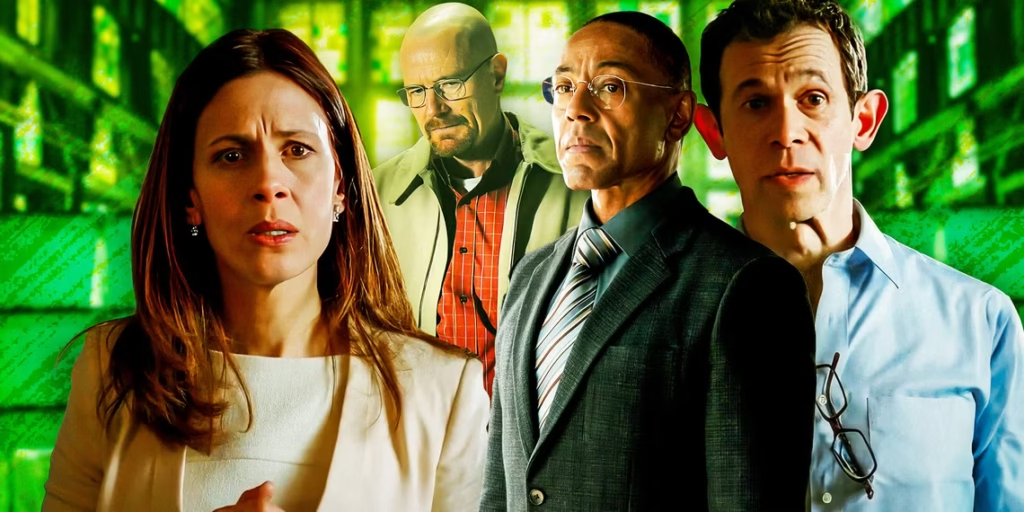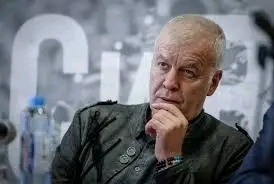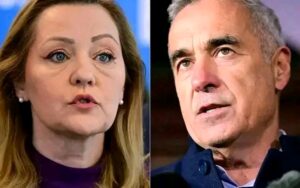
One of the most fulfilling television series ever produced was Breaking Bad, but even if there aren’t many unanswered questions, viewers are still demanding answers to those questions.
There are still significant chronological holes that may use more explanation, even though the spin-off prequel Better Call Saul and the epilogue film El Camino tackled some of the most important riddles in the world of this series. Long after the finale aired, viewers continued to explore Breaking Bad’s riddles, whether it was through specifics about off-screen occurrences or more subtle insights into the characters’ backstories.
Vince Gilligan, the creator of Breaking Bad, has frequently expressed his thoughts on the unresolved issues that the show left hanging, but certain riddles have never been definitively addressed in the canon. There are countless topics for discussion on a show as conceptually and narratively rich as Breaking Bad, whether it is the early hints that Hank should have realised Walt was Heisenberg or the Skyler White moments that made viewers cheer for her. Even while there may never be a definite explanation to these puzzles, Breaking Bad’s legacy ensures that it will probably continue to be one of the most talked-about television programs for many years to come.
The Years Between J. P. Wynne and Grey Matter
Walt never realised his full potential, and Breaking Bad never explained why.
Walter White’s past is partially revealed by Breaking Bad, but many aspects of how he got to where he is are still unknown. It’s evident that Walt and Elliott Schwartz, his then-best friend, attended the California Institute of Technology. The two of them went on to establish Grey Matter Technologies. Walt was briefly engaged to his lab assistant Gretchen before he became anxious about her family’s wealth and abruptly left her on the Fourth of July weekend because of his own insecurity. Walt’s pioneering work on proton radiography also helped a project win the Nobel Prize.
Walt had many more opportunities in the years before to becoming a struggling teacher at J. P. Wynne High School, but his frail ego caused him to sell his Grey Matter share for $5000. It’s unknown how Walter became a teacher and then accepted a demeaning second job at the A1A Car Wash, but he was still working as a scientist at Sandia Laboratories just before Walt Jr. was born. It’s still unclear if Walt’s ego led him to resign or be fired, or whether Jr.’s cerebral disability prevented him from pursuing his goals.
Walt’s mother
Walt’s mother was mentioned in Breaking Bad, but she never appeared on the program.
Walter White’s parents would be the first thing a psychologist would ask him if he were ever self-reflective enough to see one, yet Breaking Bad never went into great length about his background. Viewers learnt relatively little about Walter’s mother, despite the fact that it was revealed that Walt’s father passed away from Huntington’s disease when he was six years old and that seeing his father rely on others affected his own unwillingness to receive cancer treatment. Walt’s mother was obviously still alive during Breaking Bad, and in “4 Days Out” from season 2, he even made up a story about seeing her.
Although it is evident that Walter and his mother were not close, viewers are never introduced to Mrs. White, and given that she reared such a narcissistic and manipulative son, it is difficult to avoid wondering about her personality. It would also be interesting to observe Mrs. White’s reaction when she learnt that her only son had become Heisenberg, the infamous meth kingpin. All viewers can do is make assumptions about Mrs. White’s personality despite the fact that these significant gaps in Walter’s past would provide valuable insight into the man he became.
Why Marie and Hank Are Childless
The reason Hank and Marie didn’t have children was never made clear in Breaking Bad.
ASAC Walter White was nearly entirely different from Hank Schrader. As a driven and well-liked DEA agent, Hank advanced through the ranks of Albuquerque’s police force. Unlike Walt, who was always hampered by his ego, Hank’s ego worked to his advantage and helped him become a high-ranking officer. This childless pair, who were Walt’s brother-in-law and the spouse of Skyler’s sister Marie, had little financial concerns at the start of Breaking Bad and exemplified the kind of opulent existence the Whites could have enjoyed had Walt fulfilled his potential.
The fact that Hank and Marie are childless is, nevertheless, a significant omission from their life. The couple were like surrogate parents for Walt Jr., especially when the Whites struggled in their marriage and Walt’s deceptions tore their family apart. Marie’s affection for newborn Holly was a strong indication of her maternal instincts. Although it provided them the ideal contrast to Walter and Skyler’s struggles, it was never revealed in Breaking Bad whether Hank and Marie experienced fertility problems or chose to forgo having children in order to focus on their jobs.
The Published Author, Skyler
There was little information about Skyler’s writing career in Breaking Bad.
It was disclosed in the first few seasons of Breaking Bad that Skyler White had written a book of short stories and hoped to pursue her writing career. By disguising the inquiry as research for a short piece, Skyler even attempted to discreetly talk to her sister Marie about her concerns that Walter was smoking marijuana in season 1. Although Marie suggested that Skyler write a novel as it would probably sell better, the program had completely abandoned this subplot as it moved into its latter seasons.
It would be intriguing to learn more about Skyler’s writing background, though, given Marie’s support suggested she had the capacity to succeed. Given that publishers would be keen to promote a candid book from the wife of the notorious Heisenberg, it would be intriguing to see if Skyler resumed her writing career in the post-Breaking Bad timeline. After the events of Breaking Bad, Skyler had a genuine narrative to share, even though her time spent writing short stories may have been a means of providing some extra cash for her suffering family at the time.
The Kleptomania of Marie
The core of Marie’s propensity for stealing was never explored in Breaking Bad.
The idea that no one was genuinely good or bad and that practically every character had a flaw that called into question their moral integrity was one of Breaking Bad’s most captivating features. Despite being as far away from the brutal atrocities of Heisenberg as possible, Marie Schrader still struggled with her own issues since she broke bad and frequently stole from jewellery stores and even open houses. It’s clear that Marie’s kleptomania was a problem even before viewers were first exposed to her stealing tendencies in Breaking Bad, since she was receiving therapy to address it.
Although it seemed to flare up during periods of extreme stress and that she used stealing as a coping technique, the reasons for Marie’s theft were never completely explained in Breaking Bad. Marie’s kleptomania and obsessive-compulsive behaviours demonstrated how, like Walter, she felt that something was lacking from her life and, instead of confronting her fears, used the excitement of criminal activity to fill the void. Although this subplot was never fully resolved, it was an intriguing hint into the hidden depth of Marie’s character and could indicate a variety of things, including the struggles of a childless marriage or a workaholic husband.
The Way Gale Broke Bad
There were a lot of unanswered questions about Gale Boetticher in Breaking Bad.
Breaking Bad did not shed much light on Gale Boetticher’s decision to break bad, but it did reveal how Walter White gradually succumbed to his dark side and became a malevolent force. Prior to his horrific death at the hands of a bullet fired by Jesse Pinkman, Gale was Walter’s lab partner and the scientist that Gus Fring had employed to operate in his underground meth lab. Gale was obviously a brilliant scientist whose brilliance posed a threat to Walter, but it was unclear what his goals in the criminal underworld were.
In addition to having an MS in organic chemistry with a focus on X-ray crystallography, Gale was a multi-talented man who loved coffee, cooking, learning foreign languages, and Peter Schilling’s music. Even while Gale’s Libertarian views could be interpreted as a rationale, as a self-described nerd, the motivations for his desire to create meth and ruin countless lives seem inconsistent with his past. Better Call Saul went into much detail about Gale and Gus’s past with the Max Arciniega Chemistry Scholarship, but there are still unanswered questions regarding Gale Boetticher.
Gretchen, Walter, and Elliott
Walt’s resentful viewpoint never allowed Breaking Bad to reveal Gretchen and Elliott’s past.
Enough hints can be found in Breaking Bad to piece together the intricate past of Walter, Gretchen, and Elliott—a story of ego, jealousy, and insecurity. It’s evident that Caltech alums Walter and Elliott established Grey Matter Technologies somewhere in the 1980s. Following the breakup of Walter and his ex-girlfriend Gretchen, the two reunited, and they took pleasure in Grey Matter’s growth into a multibillion-dollar corporation. But the specifics of what happened were never made clear, and Walter’s version of events differs greatly from that of his former coworkers.
Walter became enraged and yelled about how they “cut me out” of their firm when Gretchen confronted him about lying about her and Elliott paying for his cancer care. Gretchen was astonished and said, “That can’t be how you see it.” Walter’s departure from Grey Matter was obviously accompanied by a great deal of broken feelings, and every indication suggests that he let his ego stand in the way of his tremendous achievement. A detailed account of what transpired would be fascinating, even though viewers are able to piece it together.
Gus’s Chilean Life
A lot of Gustavo Fring’s past was left unclear by Breaking Bad.
The early life of one figure is still mostly unknown. His name may even be an alias because neither Mike Ehrmantraut nor the DEA could locate any documentation of him before to his arrival in Mexico in 1986. Eladio Vuente, the Cartel boss, implied in the Breaking Bad season 4 episode “Hermanos” that he was aware of Gus’s criminal history in Chile, where Gus claims to be from. The most frequently suggested concept for another spin-off series rooted in this setting is this intriguing void in the Breaking Bad timeline.
Gus’s Chilean history is further hinted at in Better Call Saul, but the specifics have always been a little hazy, despite the fact that they suggest he rose to the position of high-ranking general in the Chilean military. It’s reasonable to assume that Gus might turn into a war criminal or a wanted fugitive given the suggestion that he somehow erased all documentation of his stay in Chile. A third Breaking horrible series would be a horrible concept for a number of reasons, even though it could be intriguing to go into Gus’s origins in a prequel series.
How Brock Was Poisoned by Walt
The details of Walt’s poisoning of Brock were never revealed in Breaking Bad.
The discovery that Walter White poisoned little Brock Cantillo in order to turn Jesse Pinkman against Gus Fring was one of the most shocking turns in Breaking Bad’s history. This intricate and crafty scheme was one of Walt’s most heinous deeds and demonstrated his capacity for unimaginable evil in the service of his self-interest. The specifics of how it all transpired were never made clear to viewers, even though they were informed that Walter poisoned Brock with Lily of the Valley and that Huell had taken Jesse’s ricin cigarette to muddle the situation.
Although the in-universe explanation for how Walter poisoned Brock was never given to viewers, Vince Gilligan, the creator of Breaking Bad, did discuss the matter at Comic-Con International 2013 (via Digital Spy). Gilligan claimed that he and the authors discussed “The Evil Juicebox Man” and that Walter “put it in a juice box” that “got into Brock’s school somehow” after crushing up some of the poison. Even while there isn’t a clear explanation for how Walt made sure Brock consumed the toxic plant, this intriguing notion explains why he appeared so suspicious when they met again after Brock recovered.
What Became of Walt’s Funds
The way Walt’s money was spent was not entirely addressed by Breaking Bad.
In one of the greatest television finales ever, Walter White closes all the loose ends and has a near-happy ending as he passes away surrounded by the meth lab equipment that gave him a sense of vitality. Walt’s wish to leave something for his family was the show’s central theme, and it appeared that he succeeded in doing so by threatening Gretchen and Elliott with assassination.
On Walt Jr.’s eighteenth birthday, Walter most likely managed to leave $9 million to his family in the form of an irrevocable trust, but it is unclear how this money was spent or whether the authorities confiscated it. It would be interesting to learn how Walt Jr. and his family lived their lives after Breaking Bad and whether Walt Jr. realised the money came from Walt. It was never made clear how the White family truly used their fortune, even though they probably traded it all to escape the gloomy shadow that Heisenberg’s legacy cast over their lives.







